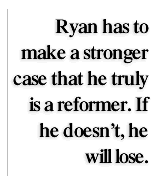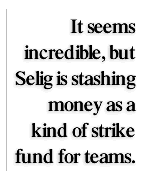Why Jim Ryan Could Be In Trouble
Speaking as someone who predicted the one-two finish of Scott Walker and Jim Ryan, the big surprise of the county executive race was Tyrone Dumas‘ strong fourth place finish, just behind Tom Nardelli. This is but one of the many factors that seem to bode well for Jim Ryan in this race.
 Dumas’ supporters, after all, were mostly African American or white liberals. Since Ryan is now paired against conservative Scott Walker, it seems a safe bet Ryan will get the Dumas votes. Ryan also has the momentum, having come from nowhere with little name recognition to take second place. Ryan will probably get the backing of labor unions, who are somewhat suspicious of him but are dead certain that Walker would privatize union jobs. Ryan has also gained considerable support from business leaders and even some Republicans. The elite leadership of the community is likely to side with Ryan, including the Milwaukee Journal Sentinel, which endorsed Ryan in the primary.
Dumas’ supporters, after all, were mostly African American or white liberals. Since Ryan is now paired against conservative Scott Walker, it seems a safe bet Ryan will get the Dumas votes. Ryan also has the momentum, having come from nowhere with little name recognition to take second place. Ryan will probably get the backing of labor unions, who are somewhat suspicious of him but are dead certain that Walker would privatize union jobs. Ryan has also gained considerable support from business leaders and even some Republicans. The elite leadership of the community is likely to side with Ryan, including the Milwaukee Journal Sentinel, which endorsed Ryan in the primary.
Ryan and Walker both had a strong showing in the suburbs, which leaves the city as the swing “district,” and Walker has a history of legislative votes that hurt Milwaukee. And Walker is a Republican trying to win a city that votes heavily Democratic. As his voting record gets explored by the media, Walker may have a tough time explaining himself to city voters.
So does this mean Ryan will win? Not necessarily. Ryan’s problems are many. He has used up all of his campaign money, while Scott Walker has more than $100,000 still on hand. And Ryan will face a daily pounding from conservative talk radio hosts like Charlie Sykes and Mark Belling. Both could be accused of bias since Walker has been a frequent guest on their programs, but they will both try to turn this around by painting the Journal Sentinel as a “liberal” paper that is biased against Walker.
What has been clear since the beginning of the recall effort is that the issue has activated both Democrats and Republicans. This race is not about party, it’s about reforming county government. Voters will want to know that somebody has the experience and insider knowledge to transform county government, which Ryan has emphasized. But they also want an assurance that their candidate truly backs reform. That has been Walker’s strength and Ryan’s weakness.
On April 30th, the only race will be for county executive, and it’s a cinch that the voters who are most likely to go to the polls will want reform. Ryan has less than a month to make a stronger case that he truly is a reformer. If he doesn’t, he will lose.
The Big Losers
 Who were the biggest losers in Tuesday’s election? By far the biggest was Tom Nardelli, who spent a ton of money, yet barely beat political neophyte Tyrone Dumas, who spent little. Nardelli complained that not enough people came out to vote, but a higher turn-out would have probably increased the margin for Walker and Ryan. Nardelli simply never made it clear what he stood for, while Walker was the clear reform choice and Ryan emphasized competence. This leaves Nardelli in a terrible position to run for mayor: with his campaign war chest gone and after such a poor showing in the city, he will have a tough time generating new donations or making a case he can win. That’s good news for Ald. Marvin Pratt, who becomes even more of a front runner among possible challengers to Mayor John Norquist.
Who were the biggest losers in Tuesday’s election? By far the biggest was Tom Nardelli, who spent a ton of money, yet barely beat political neophyte Tyrone Dumas, who spent little. Nardelli complained that not enough people came out to vote, but a higher turn-out would have probably increased the margin for Walker and Ryan. Nardelli simply never made it clear what he stood for, while Walker was the clear reform choice and Ryan emphasized competence. This leaves Nardelli in a terrible position to run for mayor: with his campaign war chest gone and after such a poor showing in the city, he will have a tough time generating new donations or making a case he can win. That’s good news for Ald. Marvin Pratt, who becomes even more of a front runner among possible challengers to Mayor John Norquist.
Another big loser was labor. Unions backed Nardelli, judicial candidate John Brennan and school board candidate Annie Wacker, and lost every race. A third loser was political consultant Todd Robert Murphy. Murphy handled the campaigns of Nardelli and Brennan (where he made vicious comments about his opponent Kevin Martens) and did the pro-Wacker “independent” ads financed by vouchers opponent Jack Rosenberg. All three efforts by Murphy failed.
Poor Little Rich Guy
 Last Sunday’s New York Times Magazine had a neat little piece by Andrew Zimbalist, perhaps the best of the small cadre of sports economists in America. The article was yet another analysis undercutting Bud Selig‘s claim that baseball is losing money, but Zimbalist added some new details. He noted that much of the league’s national media revenue flows to the central office of Major League Baseball, run by Selig, which has seen its expenses rise from less than $25 million to $180 million in the last ten years.
Last Sunday’s New York Times Magazine had a neat little piece by Andrew Zimbalist, perhaps the best of the small cadre of sports economists in America. The article was yet another analysis undercutting Bud Selig‘s claim that baseball is losing money, but Zimbalist added some new details. He noted that much of the league’s national media revenue flows to the central office of Major League Baseball, run by Selig, which has seen its expenses rise from less than $25 million to $180 million in the last ten years.
One reason for the increase is bigger salaries for execs and staff, Zimbalist noted, and indeed, Commissioner Selig now earns $3 million, compared to $1 million just seven years ago. Selig also gets a private jet and a 7,400 square foot suite in the Firstar Building downtown.
Zimbalist also estimates that Selig has spent “tens of millions of dollars” on the Major League Baseball web site (for which former Journal Sentinel reporter and longtime Selig champion Michael Bauman now writes). But Zimbalist also suggests Selig is stashing money as a kind of strike fund for teams, should the season (and the teams’ revenue flow) be suspended. Given how badly the last strike hurt baseball, it seems hard to believe Selig would countenance another one. But to judge by their recent, widely-condemned idea of contracting the league, the MLB’s leaders remain as tone deaf as ever to the concerns of baseball fans.
Dirty Hands
These are not good days for Assembly Speaker Scott Jensen (R-Waukesha). A recent story in the Wisconsin State Journal offered a four page-spread detailing all the evidence against him in the legislative caucus scandal. The story offered a sidebar on the seven employees with ties to Jensen who’ve been given immunity from prosecution, including Jensen’s longtime aide, Steve Baas, and five former employees of the Assembly Republican Caucus.
The story quoted memos showing that state employees (who worked for the Republican caucus) distributed 1.2 million pieces of campaign literature, developed computer voting lists and produced 90% of the labels on mailers for Republican assembly candidates, and deployed staff to work on races and even recruit candidates throughout the state. The staff was also getting paid by taxpayers to do opposition research, digging up arrest records, employment problems, even problems at church that Democratic candidates might have had.
All of this activity operated out of the office of Jensen, who was the “mastermind,” as one former caucus employee claimed. “The sole purpose of the caucuses is to get members reelected,” said a former member.
Much of this has come out in bits and pieces, but the State Journal story put everything together in one clear (and long) narrative. Fortunately for Jensen, the newspapers in his area (the Journal Sentinel and Waukesha Freeman) haven’t followed suit.
Jensen’s counterpart, Senate Majority Leader Chuck Chvala (D-Madison), is likely in just as much trouble. In fact, there are eight employees tied to Chvala who have been given immunity in this investigation. Both leaders went so far in their politicizing of government employees that workers began ratting on them to the media. Jensen and Chvala are talented leaders willing to do the dirty work to build their parties. But that is precisely what is likely to cause both to be indicted.
This article was originally published by Milwaukee World.
Murphy's Law
-
Top Health Care Exec Paid $25.7 Million
 Dec 16th, 2025 by Bruce Murphy
Dec 16th, 2025 by Bruce Murphy
-
Milwaukee Mayor’s Power in Decline?
 Dec 10th, 2025 by Bruce Murphy
Dec 10th, 2025 by Bruce Murphy
-
Total Cost of Foxconn Is Rising
 Dec 8th, 2025 by Bruce Murphy
Dec 8th, 2025 by Bruce Murphy





















